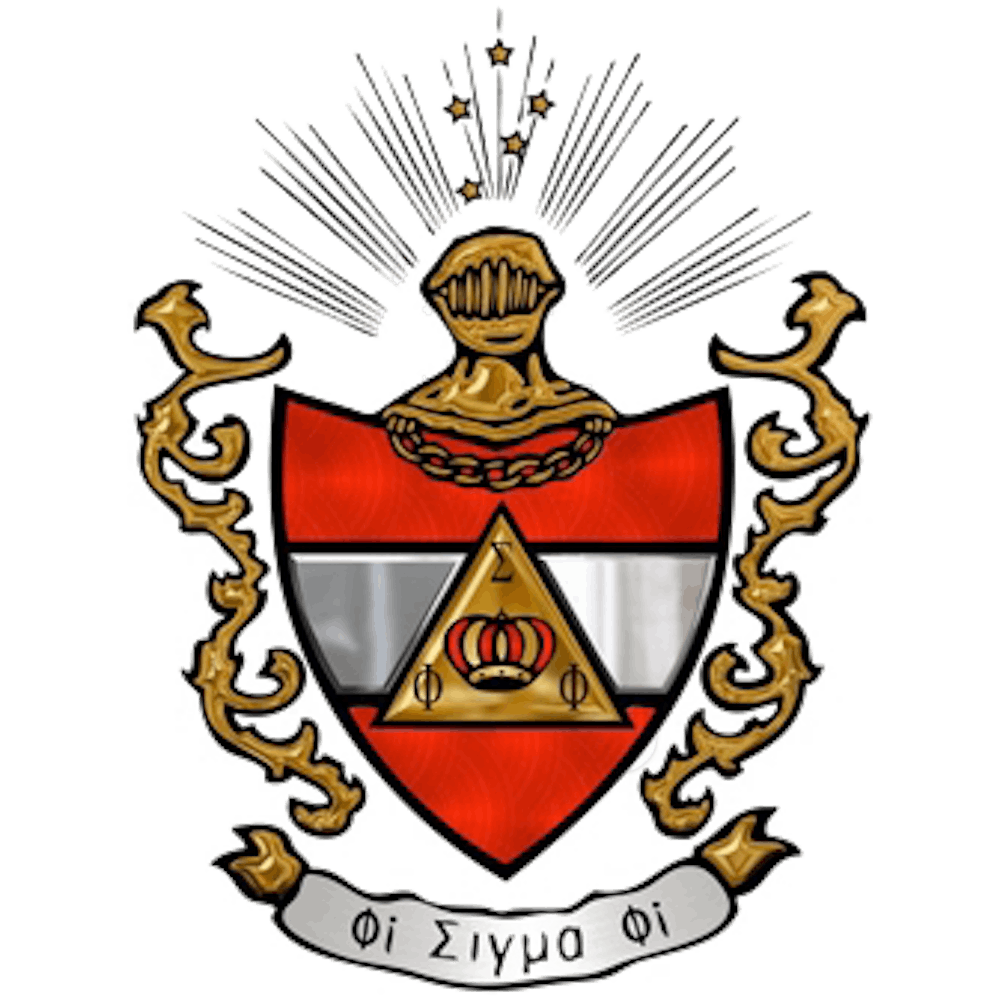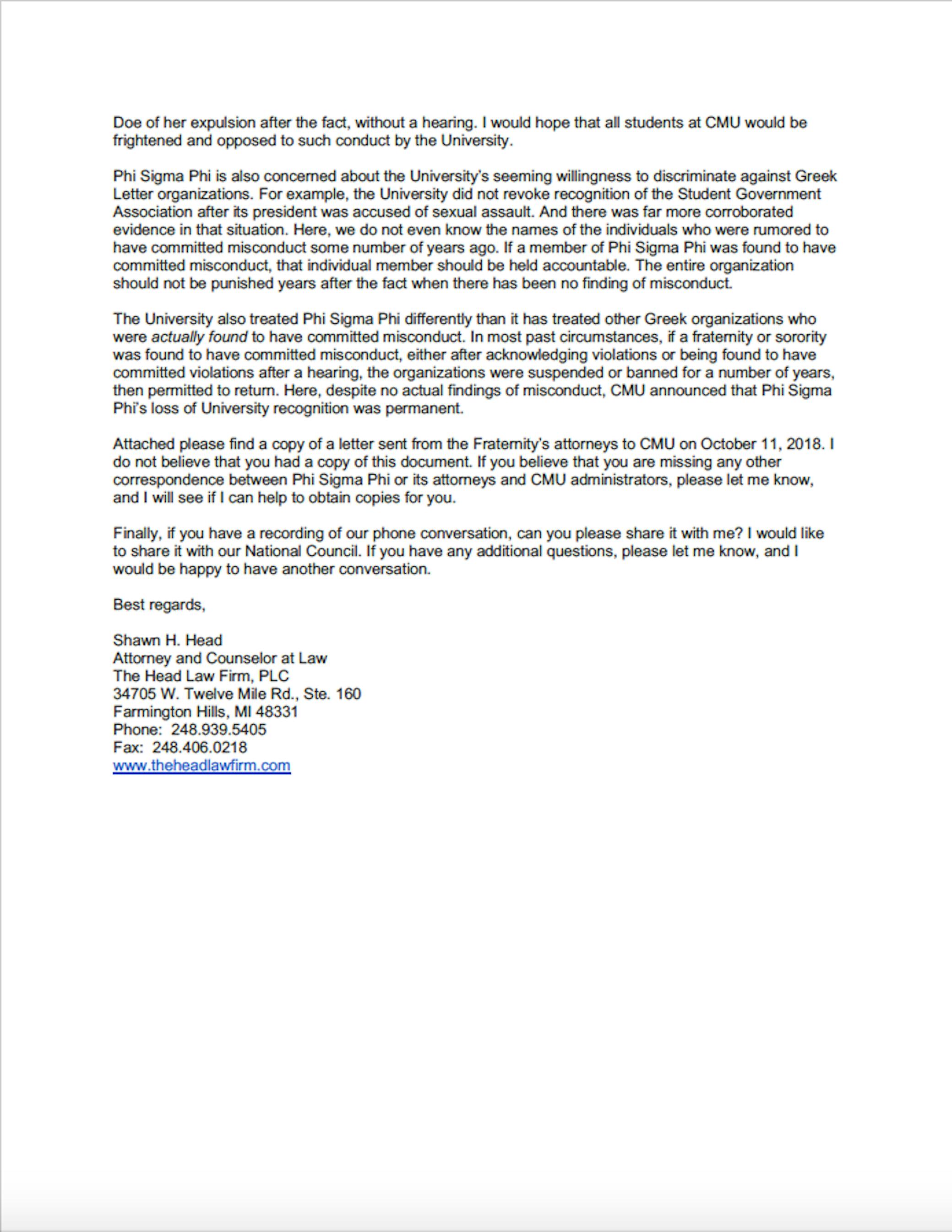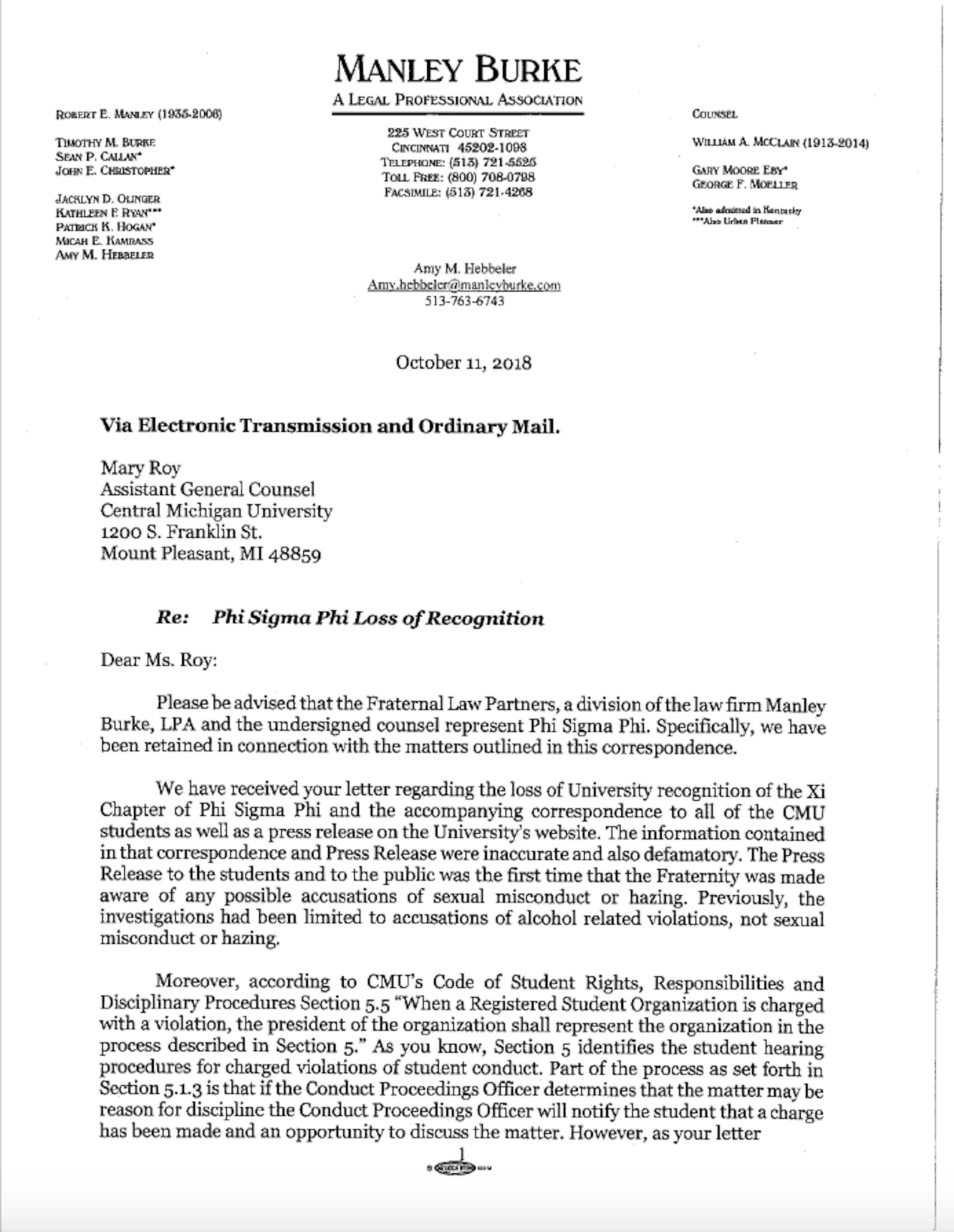PSP's national office will continue to support Xi chapter despite CMU removal

Phi Sigma Phi's status as a Registered Student Organization was permanently removed by Central Michigan University on Oct. 9, 2018.
Though the Xi chapter of Phi Sigma Phi has been accused of more than a dozen complaints of sexual misconduct, use of date rape drugs, hazing and inappropriate behavior, it continues to operate with the support of its national chapter.

Shawn Head is the acting Phi Sigma Phi National Director of Risk Management and an attorney at The Head Law Firm in Farmington Hills, Michigan. (Courtesy Photo | Phi Sigma Phi website)
PSP National Director of Risk Management Shawn Head, a 2005 Central Michigan University alumnus and Xi chapter brother, asserted the national organization stands with its brothers.
"Until there is a finding of misconduct, we will support our members as long as they continue to uphold their obligations to the fraternity," Head said. "We will absolutely support them."
When CMU announced its decision to remove PSP on Oct. 9, 2018, that was the first time the fraternity had heard of the accusations of sexual misconduct and hazing.
PSP only received information about the complaints against them, Head explained, after submitting a Freedom of Information Act request to CMU for all documents regarding the allegations, Head said.
If CMU had notified the fraternity of the complaints, he said PSP would have cooperated with any university investigation.
"If the national fraternity had any knowledge of any of our members doing anything such as sexual assault, or a major hazing violation – or any of the things we have been accused of doing – we would have absolutely investigated those things ourselves and taken swift and permanent action," Head said.
Head's main concern with the accusations is that none of the accusers decided to come forward. Many of the Office of Civil Rights and Institutional Equity complaints ended when the women declined to move forward, citing a fear of retaliation from PSP members and other sororities and fraternities.
"Anybody can accuse anybody of anything at any time," Head said. "That's why we have policies and procedures, and the right to have a hearing or have due process. None of that happened."
Head argued that CMU treated PSP unfairly in its decision to remove the fraternity, and did not follow its own Code of Student Rights, Responsibilities and Disciplinary Procedures. Section 5.2 of the code outlines student hearing procedures for violations of the code of student conduct.
He said the fraternity was never afforded a hearing. Head's assertion that PSP deserved a hearing would fall under the Office of Student Conduct, within the student code.
However, the decision to remove the fraternity was made by university officials based on the number of accusations and the lack of cooperation from witnesses and PSP members. When CMU ended PSP's status as a Registered Student Organization, the decision came from Steven Johnson, vice president of Enrollment and Student Services, not from the Office of Student Conduct.
"A trail of repeated, similar accusations against Phi Sigma Phi over the past several years shows a significant threat to the safety of our students," Johnson said in the press release announcing PSP's removal. "Our concerns have been affirmed multiple times by the inability to find witnesses willing to discuss allegations."
While Head believes the university violated its own code of conduct rules, Tony Voisin, associate vice president of Student Affairs said the fraternity losing its recognition was an RSO action.
"None of what happened to PSP is a code of conduct situation. It was not a disciplinary situation," he said. "This was taking away recognition of an RSO."
The university has the right to recognize or disassociate with RSOs, regardless of the code of conduct, Voisin said. He acknowledged that the university did not follow the code of conduct, because it was not a conduct issue.
The decision came from CMU's concern over student safety after numerous allegations against the fraternity.
"The university stands by its decision," Voisin said. "This was not a rush to judgment."
Johnson also cautioned students to avoid the group and events they host.
Following the announcement, PSP's attorneys sent the university a cease and desist letter. The letter, sent to Mary Roy, CMU associate general counsel on Oct. 11, 2018, stated Johnson's press release was incorrect and defamatory.
"You are hereby directed to cease and desist from making further statements relating to Phi Sigma Phi and the Xi Chapter," the letter stated. "Additionally, you are directed to retract the statement as it is false and defamatory.
"Should Phi Sigma Phi learn you made further defamatory statements or you refuse to retract the statements previously made, it retains the right to proceed with a lawsuit to clear its name and seek compensation for the damage to its reputation."
In an April 4, 2019 interview with Head, he said that pursing litigation against the university is "still on the table."

In an email to CM Life University Editor Melissa Frick, Phi Sigma Phi Director of Risk Management Shawn Head details the fraternity's frustrations with CMU.

In an email to CM Life University Editor Melissa Frick, Phi Sigma Phi Director of Risk Management Shawn Head details the fraternity's frustrations with CMU.

A cease-and-desist letter sent to Central Michigan University Associate General Counsel Mary Roy from Phi Sigma Phi's attorney's on Oct. 11, 2018.

A cease-and-desist letter sent to Central Michigan University Associate General Counsel Mary Roy from Phi Sigma Phi's attorney's on Oct. 11, 2018.

A cease-and-desist letter sent to Central Michigan University Associate General Counsel Mary Roy from Phi Sigma Phi's attorney's on Oct. 11, 2018.






